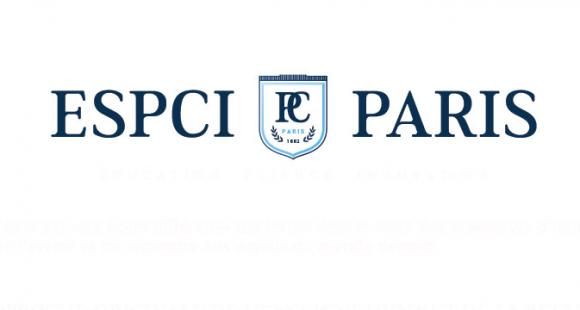ESPCI ParisTech

ESPCI ParisTech is a major institution of higher education (a French "Grande École d’ingénieurs"), an internationally renowned research center, and a fertile ground of innovation for industry.
Founded by the City of Paris in 1882, for over a century the School has attracted leading scientific innovatorslike Nobel Prize laureates Pierre and Marie Curie, Paul Langevin, Frédéric Joliot-Curie, Pierre-Gilles de Gennes, and Georges Charpak, who continue to contribute to the institution’s international reputation.
The School’s culture of excellence remains as vibrant as ever. Fully 60% of graduates go on to complete a thesis and earn their PhD. The School’s teaching faculty and researchers are building tomorrow’s knowledge base, publishing an article a day in top international scientific journals ; inventing the industry of the future, filing for a patent every single week.
Scientific excellence is our core value
Ever since it was founded, ESPCI ParisTech has been gaining in prestige and status. Evolving from a municipal school established to train industrial production managers, it has achieved the status of a major institute of higher education in science and engineering, which recruits students via the most selective competitive examination in France - an exam in common with École Polytechnique and, since 2011, the Écoles Normales Supérieures (ENS schools).
This steady progress has been maintained by constant focus on scientific excellence in teaching and research alike.
The five Nobel Prize winners associated with the School - Pierre Curie, Marie Curie, Frédéric Joliot-Curie, Pierre-Gilles de Gennes, and Georges Charpak - are emblematic of the exceptional ethos embodied in the permanent culture of excellence.
ESPCI ParisTech is also the only institute of higher education whose directors have all been inducted into the French Academy of Sciences (apart from Charles Lauth, the visionary chemist, industrialist and founder). From Paul Schützenberger to Jacques Prost, including Paul Langevin and Pierre-Gilles de Gennes, all the directors of ESPCI ParisTech have embodied the ideal of scientific excellence, which is the guiding principle in ensuring the institution’s world-class status.
The unfailing commitment to scientific excellence at ESPCI ParisTech explains the School’s international prestige and position in the global community. In 2010, for the third year running, the Shanghai Ranking" (Academic Ranking of World Universities, ARWU) placed ESPCI ParisTech in the lead among France’s institutions of science and engineering, demonstrating again that the ambition of scientific excellence is a viable, complementary alternative to size and scale in rivaling the world’s top universities.
Organization
ESPCI ParisTech was founded in 1882 by the Paris City Council; its legal status changed on January 1, 2006, and it now operates as an autonomous municipal administrative corporation (a Régie autonome, in French).
The Paris City Council decided on July 11 and 12, 2005, to change the legal status of ESPCI ParisTech (École Supérieure de Physique et de Chimie Industrielles) and EIVP (École des Ingénieurs de la Ville de Paris, City of Paris Engineering School), by granting both institutions legal personality and financial autonomy.
The purpose of the reform is to provide the two engineering schools, which were previously administered as departments of the city government, the necessary autonomy to fully carry out their mission, while strengthening their ties to the City of Paris, which continues to finance most of their activities.
ESPCI ParisTech is now administered by a Board of Directors with general powers, and which elects its Chairman from among the City Councillors on the Board. The Chairman has full powers for administration of the corporation (Régie), for staff appointments, budget execution, and legal action. The School has its own budget, the essential part of which is appropriated from the City’s funds, thus allowing it to implement educational and scientific policiesin a flexible, reactive and independent manner.
The School has also established an International Scientific Committee.
